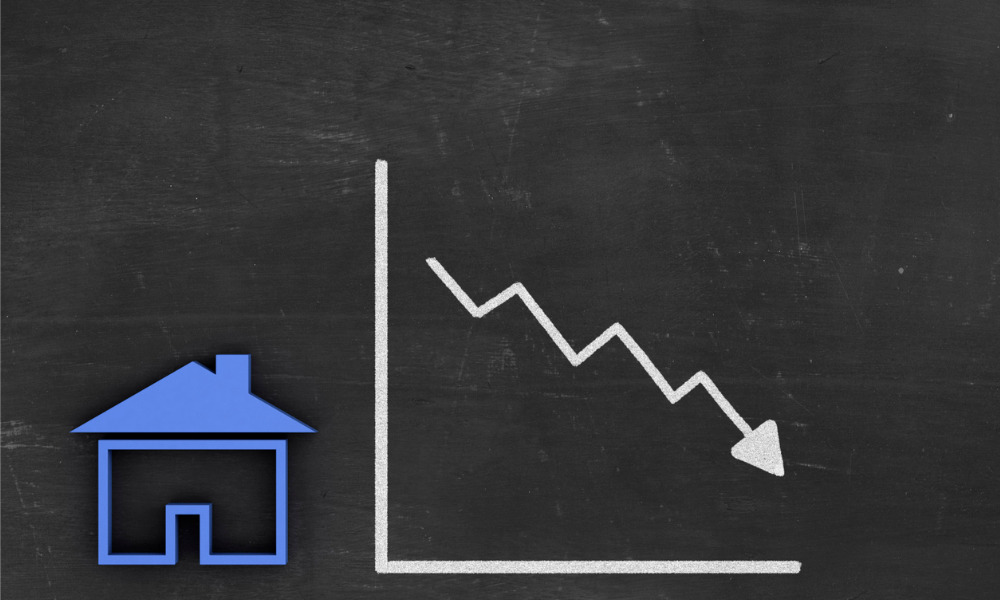The central bank will likely focus on putting inflation under control, economist says

House prices will likely take the back seat for the Reserve Bank for the time being, as continued controlled falls help meet one of the central bank’s mandates, according to Nick Goodall, CoreLogic head of research.
Paul Conway, RBNZ chief economist, recently said a further 9% dip in house prices could bring them back to a sustainable level, which Goodall said contributed to the outlook that inflation and the health of the economy would rank above the housing downturn.
“If prices start reducing at a faster rate, that could become interesting, but at the moment because it’s quite a controlled downturn, so I don’t think it’s causing too much concern there,” Goodall told Stuff. “The question would be if it starts to drop at a faster rate, and or kept going for more than they’re comfortable with, whether that’s 15% or 20%, then again, the question would be what are you going to prioritise?”
With the cost of living rising at its fastest pace in 32 years, Goodall said RBNZ would probably prioritise putting inflation under control above all else.
Read more: New Zealand inflation outpaces forecasts
“It will have to continue to raise the OCR, despite the fact that when you raise the OCR it has a strong downward effect on house prices,” he told Stuff. “They will do that ahead of worrying about what will happen in the housing market.”
A higher OCR would push mortgage interest rates up, reducing both the borrower pool and the amount buyers could pay.
“Until interest rates start to plateau or reduce, it’s hard to see demand bouncing back too hard, because it’s being held back so much by affordability,” Goodall told Stuff.
RBNZ is mandated by the government to keep inflation between 2% and 3%, on average, over the medium term, as well as maintain house prices at sustainable levels.
Goodall said the central bank may start to put its focus back on house prices if a sizeable number of homeowners hit negative equity – that is, when market value of the home fell below the outstanding amount of the mortgage, Stuff reported.
That threshold may be crossed, he said, if house prices dipped by 20% or more. Those likely to first enter negative equity would be the ones who bought at the market peak in November with a 20% deposit.
“That’s at a time when they’re paying even more in mortgage rates, too,” Goodall said.
It is only when homeowners cannot make mortgage repayments that negative equity becomes a problem, Goodall said. With record-low unemployment and job losses, missed payments were unlikely, Stuff reported.
CoreLogic data showed a decline of around 5.5% in house prices since the peak in November. The Real Estate Institute of New Zealand’s house price index, meanwhile, recorded sharper falls in the nation’s two largest cities, with Auckland down 7.1% in three months, and Wellington down 12.5%.
Over 2020 and 2021, house prices surged 42%.
It would be preferable, Goodall said, for the boom not to be followed by a crash, but the massive rise effectively provided RBNZ with a cushion before price falls became concerning, Stuff reported.
Read next: NZ house prices – what's going on?
Independent economist Tony Alexander’s most recent real estate survey found that buyer sentiment remained negative as it was in May, suggesting the pessimism and reservation of homebuyers were unlikely to dissipate any time soon.
Alexander predicted continued falls in prices for the next six months, but with RBNZ probably easing LVR restriction before the end of the year, which would help house prices to recover.
LVR restrictions currently require 90% of homebuyers to have a 20% deposit, while 95% of investors need to have 40%.
He said Conway contributed to his prediction.
“We are about halfway through, so I think the Reserve Bank will be providing some relief, particularly to first-home buyers, before the end of this year,” Alexander told Stuff.
Goodall disagreed, however, because low-LVR lending poses more risk, and it was unlikely that the Reserve Bank would allow more risky lending during a market downturn.
Even if LVRs were relaxed, he said buyers would be less willing to buy a home with a small deposit when the market was falling.
Goodall also said that with the increasing discussion of debt-to-income restrictions coming in, LVRs will likely be relaxed only when DTI restrictions are imposed, probably by next year, Stuff reported.



